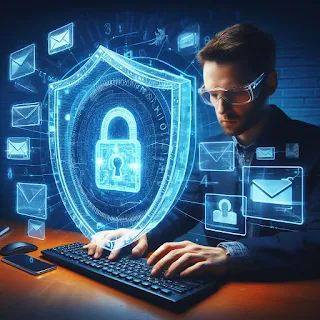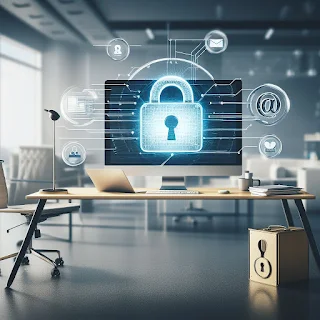Email Safety Measures:
Protecting Your Digital Correspondence
Nowadays, we send and receive dozens of emails every day. While emails have gradually replaced handwritten letters, it's important to know how to secure our email accounts to prevent any potential misuse. We'd like to share some tips on how to ensure the security of your emails. What is a cyber attack?
A cyber attack is a malicious attempt to gain unauthorized access to a computer system or network, steal data, or disrupt operations. Cyber attacks can be carried out by individuals, groups, or governments.
Who is behind cyber attacks?
Cyber attacks can be carried out by a variety of actors, including:
- Individual hackers: These are individuals who are motivated by a variety of factors, such as financial gain, political activism, or simply the challenge of hacking into a system.
- Cybercriminal organizations: These are groups of individuals who are organized and sophisticated in their attacks. They often target businesses and governments for financial gain.
- Nation-states: Governments can also carry out cyber attacks as part of their national security strategies.
What are the goals of cyber attacks?
The goals of cyber attacks can vary, but they often include:
- Data theft: Cyber attackers may attempt to steal sensitive data, such as financial information, customer data, or intellectual property.
- System disruption: Cyber attackers may attempt to disrupt the operations of a computer system or network. This can include disabling websites, bringing down servers, or causing financial losses.
- Political or ideological influence: Cyber attackers may attempt to influence public opinion or political events through cyber attacks.
What are the methods of cyber attacks?
There are a variety of methods that cyber attackers can use to carry out their attacks. Some common methods include:
- Phishing: Phishing is a type of social engineering attack in which cyber attackers send emails that appear to be from a legitimate source. The emails often contain a link or attachment that, when clicked, installs malware on the victim's computer.
- Malware: Malware is software that is designed to harm a computer system. Malware can be installed on a victim's computer through a variety of methods, such as clicking on a malicious link, opening an infected attachment, or downloading pirated software.
- Zero-day attacks: Zero-day attacks exploit vulnerabilities in software that are unknown to the software vendor. These attacks are particularly dangerous because there is no patch available to fix the vulnerability.
- DDoS attacks: DDoS attacks are designed to overwhelm a computer system or network with traffic. This can make the system or network unavailable to legitimate users.
What are the most massive cyber attacks?
Some of the most massive cyber attacks in history include:
- The WannaCry ransomware attack: In 2017, the WannaCry ransomware attack infected over 200,000 computers in over 150 countries. The attack caused billions of dollars in damage.
- The Equifax data breach: In 2017, Equifax, a credit reporting agency, suffered a data breach that exposed the personal information of over 143 million people.
- The SolarWinds hack: In 2020, SolarWinds, a software company, was hacked by a Russian government-backed group. The hackers used the attack to gain access to the networks of several government agencies and businesses.
Securing your email account is crucial when it comes to protecting your personal data. Let me answer your questions and provide you with practical tips to secure your email.
When it comes to email security, there are various types of attacks to be aware of. Phishing is a common fraudulent technique where attackers impersonate trusted entities to trick users into revealing personal or financial information. Spam, hoaxes, viruses, and malware are also threats that email users often encounter.
2-Stay vigilant with new emails: Even if you recognize the sender, remain cautious as their email account might have been compromised. Be wary of unusual requests or suspicious links.
3-Utilize separate email addresses: Use different email addresses for your professional and personal activities. This helps isolate potential risks.
4-Avoid sharing sensitive information via email: Regardless of the sender's identity, never reply to requests for confidential information via email. Opt for more secure methods like encryption or secure platforms.
5-Exercise caution with links and attachments: Refrain from clicking on links or opening attachments from untrusted sources. They could contain viruses or spyware. Delete suspicious emails without opening them.
6-Beware of scams and chain messages: Never respond to emails promising financial gains or requesting money. These are often scams. Securing your email account is an esse
ntial step in protecting your personal data.
By following these simple tips, you can enhance the security of your emails and reduce the risk of your account or confidential information being compromised. Stay vigilant and protect yourself against email intrusion attempts.How to secure your email?




Post a Comment
Dear Readers,
We value your feedback and appreciate your participation in our blog community. Please take a moment to share your thoughts, suggestions, or comments regarding our blog posts. Your feedback helps us improve and deliver content that is relevant and valuable to you.